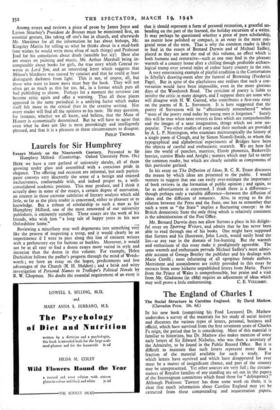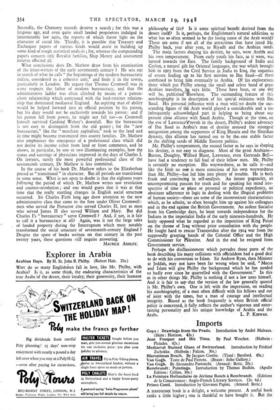The England of Charles I
The Social Structure in Caroline England. By David Mathew. (Clarendon Press. 10s. 6d.)
IN his new book (comprising his Ford Lectures) Dr. Mathew undertakes a survey of the materials for his study of social history and discusses the various types of letters, personal, business and official, which have survived from the first seventeen years of Charles I's reign, the period that he is considering. Most of this material is familiar to historians, but Dr. Mathew also makes mention of some early letters of Sir Edward Nicholas, who was then a secretary of the Admiralty, to be found in the Public Record Office. But it is difficult to maintain that such letters represent more than a fraction of the material available for such a study. For which letters have survived and which have disappeared for ever must be a matter of insignificant chance, and part of the country may be unrepresented. Yet other sources are very full ; the circum- stances of Royalist families of any standing are set out in the papers of the Interregnum committees which fined them for "delinquency." Although Professor Tawney has done some work on them, it is clear that much information about Caroline England may yet be extracted from these compounding and sequestration papers.
Secondly, the Chancery records deserve a search ; for this was a litigious age, and even quite small landed proprietors indulged in interminable law suits, the reports of which throw light on the character of social life. Thirdly, it is possible that Treasury and Exchequer papers of various kinds would assist in building up some kind of rough statistical analysis ; for, whereas the compounding papers concern only Royalist families, Ship Money and assessment returns affected all.
What conclusions does Dr. Mathew draw from his examination of the letter-writers of the early seventeenth century ? He sets out in search of what he calls " the beginnings of the modern bureaucratic milieu, considered as a cohesive unit," and finds it in the towns, particularly in London. He argues that Thomas Cromwell was in some respects the father of modern bureaucracy, and that the administrative ladder was often climbed by means of a patron- client relationship which contrasted with the lord-retainer relation- ship that dominated mediaeval England. An aspiring man of ability would be helped forward into an official position by his patron, but his duty would not be exclusively towards his patron: and if his patron fell from power, he might not fall too—as Cromwell himself survived Cardinal Wolsey's downfall. But the bureaucrat is not easy to distinguish from the old gentry ; for the " new bureaucrats," like the " merchant capitalists," took to the land and in time might become transmuted into county families. Dr. Mathew also emphasises the emergence of a professional class which did not derive its income either from land or from, commerce, and he
shows, in particular, by one or two illuminating examples, the status and earnings of physicians improved in the days of Charles I. On lawyers, surely the most powgrful professional class of the seventeenth century, Dr Mathew is less committal.
In the course of his book Dr. Mathew refers to the Elizabethan period as " transitional " in character. But all periods are transitional in some sense. What is not open to doubt is that the eighteen years
following the .period of which Dr. would writes saw revolution and counter-revolution ; and one miould guess that it was at that time that the really startling changes in English social structure occurred. Sir Charles Firth long no drew attention to the new administrative class that came to the fore under Oliver Cromwell : men who served the Protector also served Charles II, just as men who served James II also served William and Mary. But did Charles I's " bureaucracy " serve Cromwell ? And, if not, is it fair to call it a bureaucracy at all? Again, was it not the large sales of landed property during the Interregnum which most notably transformed the social structure of seventeenth-century England ? Despite the spate of books written on that century in the past twenty years, these questions i.till require answering.
MAURICE ASHLEY.































 Previous page
Previous page